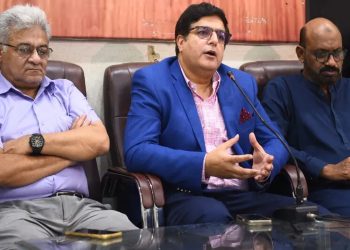LONDON: The proposed European Super League appeared dead in the water after all six English clubs withdrew following a furious backlash from fans and threats from football authorities.
Manchester City, Manchester United, Liverpool, Chelsea, Tottenham and Arsenal were six of the 12 clubs that signed up to the breakaway competition that guaranteed spots each year and billions of dollars for founding members.
The reaction has been scathing, with politicians and football chiefs threatening to take legal action against the so-called “dirty dozen”, who were told they faced potential bans from domestic and continental competitions.
Manchester City were the first to withdraw, followed by United, Liverpool, Arsenal, Tottenham and finally Chelsea — just 48 hours after the Super League was first announced. That leaves just six Spanish and Italian sides — Real Madrid, Barcelona, Atletico Madrid, AC Milan, Inter Milan and Juventus — still involved.
Manchester United announced the departure of executive vice-chairman Ed Woodward, and Arsenal apologised to fans for their “mistake”.
“As a result of listening to you and the wider football community over recent days we are withdrawing from the proposed Super League,” an Arsenal statement said. “We made a mistake, and we apologise for it.”
We will not be participating in the European Super League.#MUFC
— Manchester United (@ManUtd) April 20, 2021
The Super League said it would look at ways to rescue the venture, insisting: “The existing system does not work.” “We shall consider the most appropriate steps to reshape the project,” a statement said.
UEFA president Aleksander Ceferin said he was “delighted” and the English Football Association also welcomed the withdrawals, praising fans for “their influential and unequivocal voice”.
Reigning European champions Bayern Munich and French giants Paris Saint-Germain both came out strongly opposed to the breakaway league.
Liverpool captain Jordan Henderson tweeted a statement on behalf of the squad, saying: “We don’t like it and we don’t want it to happen. This is our collective position.”
As a result of listening to you and the wider football community over recent days we are withdrawing from the proposed Super League.
We made a mistake, and we apologise for it.
— Arsenal (@Arsenal) April 20, 2021
Earlier, Ceferin, addressing the owners, particularly of the Premier League teams involved, said there was still time for clubs to pull out. “Some will say it is greed, some complete ignorance of England’s football culture,” he said. “There’s still time to change your mind. Everyone makes mistakes.”
FIFA president Gianni Infantino issued a stark warning to the heavyweight clubs who had signed up to the ESL. “It is our task to protect the European sport model, so if some elect to go their own way then they must live with the consequences of their choices,” Infantino said at UEFA’s congress in Switzerland.
More than 1,000 fans gathered outside Chelsea’s Stamford Bridge stadium to protest against the plan before Tuesday’s Premier League match against Brighton, which ended in a 0-0 draw.
British Prime Minster Boris Johnson earlier met Premier League clubs, the FA and fan groups, vowing to do all in his power to kill the ESL plan.
He tweeted, before City’s decision was confirmed: “The decision by Chelsea and Manchester City is –- if confirmed –- absolutely the right one and I commend them for it.”
We can confirm that we have formally commenced procedures to withdraw from the group developing proposals for a European Super League (ESL).#THFC ⚪️ #COYS
— Tottenham Hotspur (@SpursOfficial) April 20, 2021
The 20-team ESL was designed by the European giants to guarantee revenue from regular matches against one another without the risk of failing to qualify for 15 founder members.
The 12 teams had signed up to share in an initial pot of more than 3.5 billion euros ($4.2 billion) to boost their revenues, which have been badly hit during the coronavirus pandemic.
Under the proposals, five more clubs would have had to qualify annually for the midweek competition, joining the 15 permanent members.
Currently, teams have to qualify for the Champions League each year through their national competitions, and survive a group phase before reaching the high-profile stages.




































